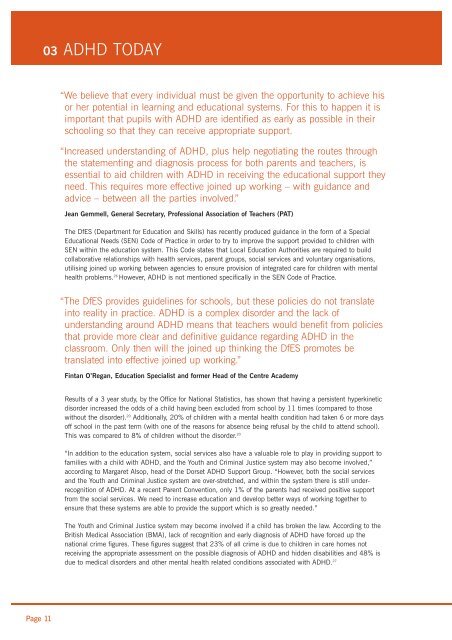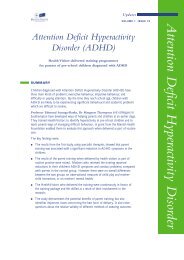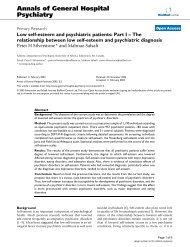are we paying enough attention? - Addiss
are we paying enough attention? - Addiss
are we paying enough attention? - Addiss
- No tags were found...
You also want an ePaper? Increase the reach of your titles
YUMPU automatically turns print PDFs into web optimized ePapers that Google loves.
03 ADHD TODAY“We believe that every individual must be given the opportunity to achieve hisor her potential in learning and educational systems. For this to happen it isimportant that pupils with ADHD <strong>are</strong> identified as early as possible in theirschooling so that they can receive appropriate support.“Increased understanding of ADHD, plus help negotiating the routes throughthe statementing and diagnosis process for both p<strong>are</strong>nts and teachers, isessential to aid children with ADHD in receiving the educational support theyneed. This requires more effective joined up working – with guidance andadvice – bet<strong>we</strong>en all the parties involved.”Jean Gemmell, General Secretary, Professional Association of Teachers (PAT)The DfES (Department for Education and Skills) has recently produced guidance in the form of a SpecialEducational Needs (SEN) Code of Practice in order to try to improve the support provided to children withSEN within the education system. This Code states that Local Education Authorities <strong>are</strong> required to buildcollaborative relationships with health services, p<strong>are</strong>nt groups, social services and voluntary organisations,utilising joined up working bet<strong>we</strong>en agencies to ensure provision of integrated c<strong>are</strong> for children with mentalhealth problems. 26 Ho<strong>we</strong>ver, ADHD is not mentioned specifically in the SEN Code of Practice.“The DfES provides guidelines for schools, but these policies do not translateinto reality in practice. ADHD is a complex disorder and the lack ofunderstanding around ADHD means that teachers would benefit from policiesthat provide more clear and definitive guidance regarding ADHD in theclassroom. Only then will the joined up thinking the DfES promotes betranslated into effective joined up working.”Fintan O’Regan, Education Specialist and former Head of the Centre AcademyResults of a 3 year study, by the Office for National Statistics, has shown that having a persistent hyperkineticdisorder increased the odds of a child having been excluded from school by 11 times (comp<strong>are</strong>d to thosewithout the disorder). 20 Additionally, 20% of children with a mental health condition had taken 6 or more daysoff school in the past term (with one of the reasons for absence being refusal by the child to attend school).This was comp<strong>are</strong>d to 8% of children without the disorder. 20“In addition to the education system, social services also have a valuable role to play in providing support tofamilies with a child with ADHD, and the Youth and Criminal Justice system may also become involved,”according to Marg<strong>are</strong>t Alsop, head of the Dorset ADHD Support Group. “Ho<strong>we</strong>ver, both the social servicesand the Youth and Criminal Justice system <strong>are</strong> over-stretched, and within the system there is still underrecognitionof ADHD. At a recent P<strong>are</strong>nt Convention, only 1% of the p<strong>are</strong>nts had received positive supportfrom the social services. We need to increase education and develop better ways of working together toensure that these systems <strong>are</strong> able to provide the support which is so greatly needed.”The Youth and Criminal Justice system may become involved if a child has broken the law. According to theBritish Medical Association (BMA), lack of recognition and early diagnosis of ADHD have forced up thenational crime figures. These figures suggest that 23% of all crime is due to children in c<strong>are</strong> homes notreceiving the appropriate assessment on the possible diagnosis of ADHD and hidden disabilities and 48% isdue to medical disorders and other mental health related conditions associated with ADHD. 27Page 11




